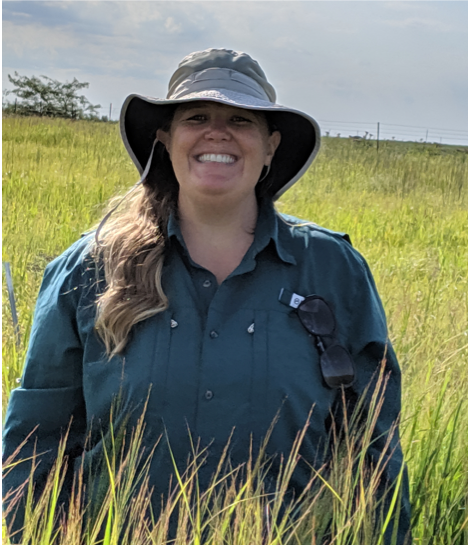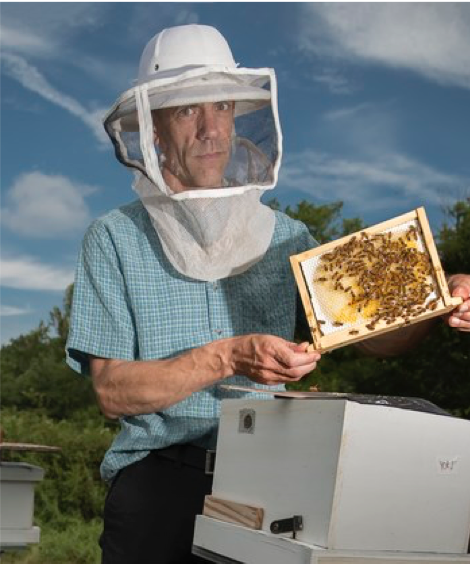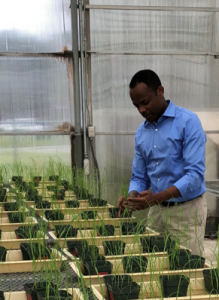 |
Kasie Raymann, PhD
Dr. Kasie Raymann is a microbiologist who uses the honey bee as a model system to study the evolution and dynamics of host-associated microbial communities. Dr. Raymann joined UNCG as an Assistant Professor in the Biology Department in January 2018. Her previous research has investigated the impacts of chemical perturbation (e.g antibiotics and pesticides) on the honey bee gut microbiome and honey bee health. From this work, Dr. Raymann has shown that both antibiotic (frequently used in beekeeping) and pesticide exposure can severely alter the gut microbiome of honey bees which leads to increased pathogen infection and mortality. The Raymann lab continues to investigate the impacts of chemical exposure on honey bees, particularly the link between chemical exposure, the microbiome, and bee reproductivity. Her more recent research aims to determine the factors that shape fine-scale microbial community structure within hosts, specifically within the gut microbiome of honey bees. Other research in Dr. Raymann’s lab involves identifying and characterizing microbial pathogens of honey bees, and determining the mechanisms host-associated microbes utilize to protect and defend against invading pathogens. |
 |
Sally Koerner, PhD
Dr. Sally Koerner is a community and ecosystem ecologist who focuses on biodiversity and the consequences of global change. Dr. Koerner joined UNCG as an Assistant Professor in the Biology Department in August 2017. Her previous research has primarily focused on plant communities and how various global change drivers such as the loss of herbivores, altered precipitation patterns, and nutrient deposition influence species interactions, community dynamics, and ecosystem function. From this work, Dr. Koerner has seen the importance of biodiversity for ecosystem function and stability in the face of global change. As such, the Koerner Lab aims to understand how biodiversity can contribute to long-term stability and sustainability of working agroecosystems. Dr. Koerner and her students work primarily in herbaceous dominated ecosystems such as the longleaf pine savannas of NC and the African savannas of Southern Africa as well as tall, mixed, and shortgrass prairies of the mid-western US where herbivores play a dominant role in structuring the plant community. The Koerner lab will continue to investigate the role of biodiversity in ecosystem function with the most recent work aiming to elucidate the consequences of network connections and trophic linkages. |
 |
Olav Rueppell, PhD
Dr. Olav Rueppell has been researching honey bee biology and health for the past 16 years. His basic research interests span genomics, behavior, and life history evolution of honey bees. Importantly, this research addresses disease ecology and the interactions between the ectoparasitic Varroa mite, its honey bee host, and viruses that can be transmitted through the mite vector but also environmentally or through direct contact. Dr. Rueppell’s varied research portfolio seeks an integrative understanding of this important pollinating species and allows connections between different concepts and disciplines, such as linking disease risk to genetics, life history and social evolution, or relating animal communication to practical apiculture. The PPC at UNCG strengthens this research by providing larger-scale facilities for colony-level experiments, extending the perspective to the landscape level, and specifically including the plant mutualists that provide all essential food to honey bees but can also be places of disease transmission between colonies and different pollination species. |
 |
Ayalew Osena, PhD
Dr. Ayalew Osena is a plant physiologist and molecular biologist. His lab aims to enhance food security in the face of changing climate by improving crop resilience to climate irregularities through molecular genetics and biotechnology. Dr. Osena joined UNCG as Assistant Professor in August 2018. His previous research focused on plant membrane transporters which play a role in abiotic stress resilience including aluminum toxicity, mineral nutrient acquisition, drought, and salt stresses. Dr. Osena also worked on improving the conversion efficiency of bioenergy feedstocks such as lignocellulose and starchy crop cassava to biofuels via genetic engineering. Currently, research in the Osena Lab is focused on two main objectives. This first objective is to improve underutilized crops, also called orphan crops, to enhance their potential for ensuring food security and nutrition. For example, the orphan crop teff (Eragrostis teff) is recognized by the U.S. National Research Council as a crop of great potential to enhance nutrition and to boost food security. The second major objective of the Osena Lab is to isolate and characterize novel traits from extremophiles to improve economically important crops. |